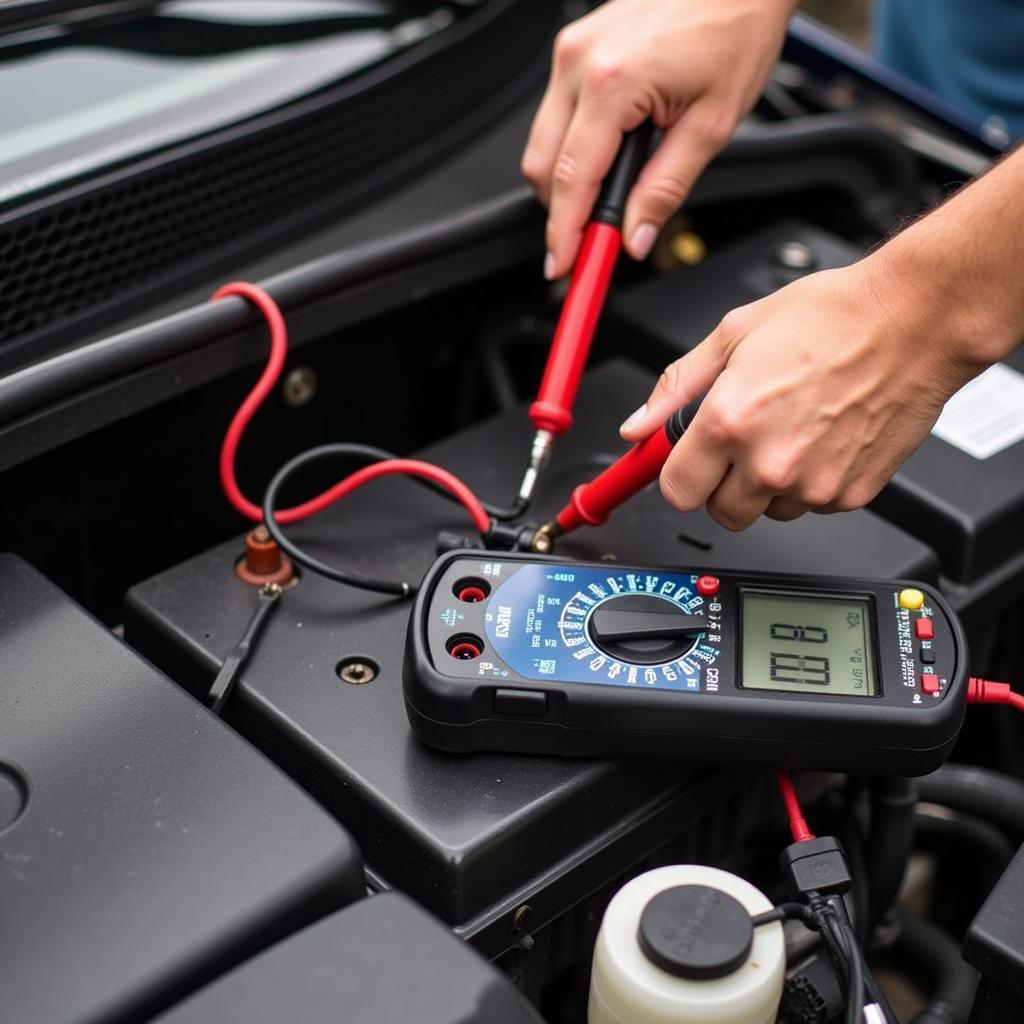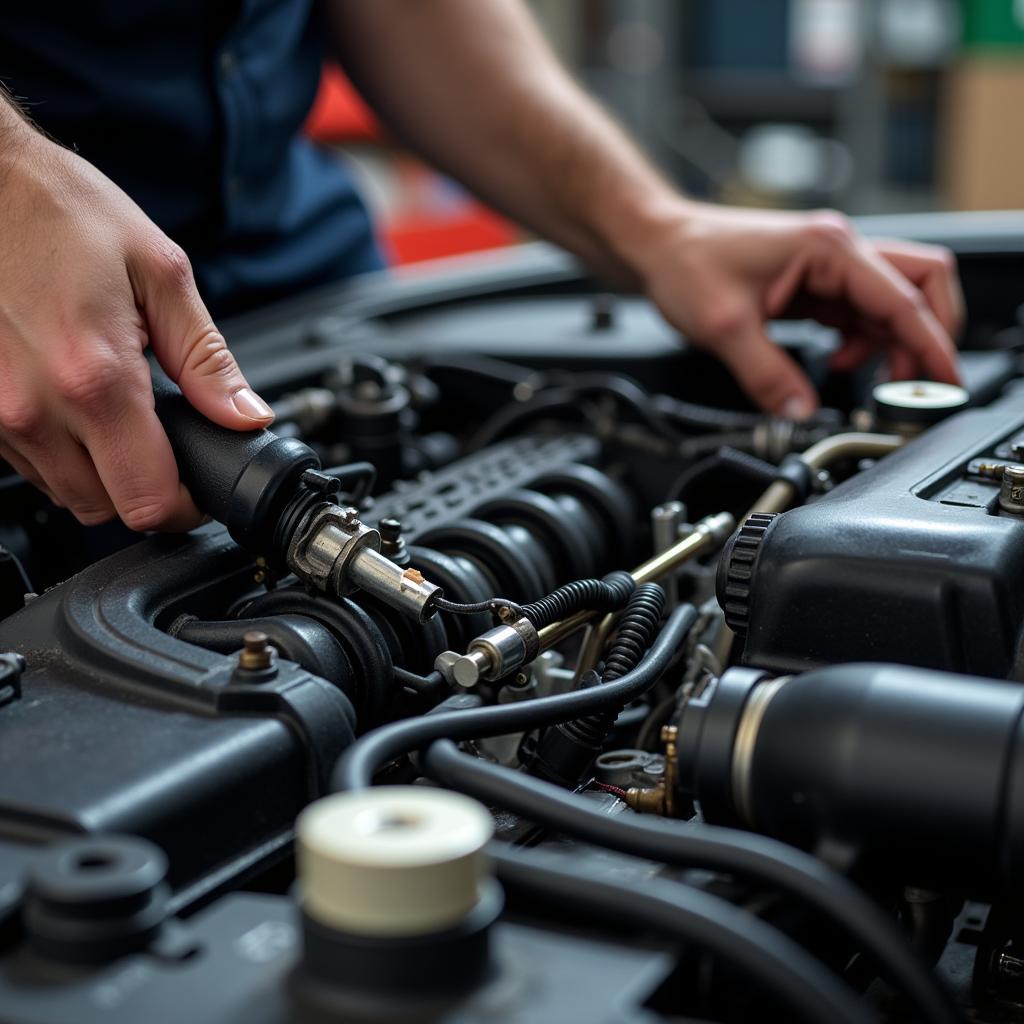Experiencing a Problem Starting Car can be incredibly frustrating. Whether it’s a click, a sputter, or complete silence, a non-starting vehicle can throw a wrench in your day. This guide will walk you through the common causes of car starting problems and provide practical solutions to get you back on the road. We’ll cover everything from simple checks to more complex issues, empowering you to diagnose and potentially fix the problem yourself.
If you are experiencing problems starting your car in cold weather, this guide has you covered! We’ll explore various reasons why your car might struggle to start in chilly conditions and offer effective solutions. Sometimes, the issue isn’t just starting the car, it’s starting the car in the morning. If this sounds like your situation, don’t worry, we’ll address this common problem as well. Read on to learn more about potential problems of starting your car and how to troubleshoot them.
Common Causes of a Problem Starting Car
There are several reasons why you might be experiencing a problem starting car. Some of the most common culprits include a dead battery, a faulty starter, a bad alternator, or issues with the ignition system. Let’s take a closer look at each of these.
-
Dead Battery: A dead battery is the most frequent cause of a car not starting. If your headlights are dim, the radio doesn’t work, or you hear a clicking sound when you turn the key, your battery is likely the issue. Jump-starting the car can be a temporary fix, but if the battery keeps dying, it’s time for a replacement.
-
Faulty Starter: The starter motor is responsible for cranking the engine. If the starter is failing, you might hear a grinding noise or experience intermittent starting problems. A faulty starter often requires professional repair or replacement.
-
Bad Alternator: The alternator charges the battery while the engine is running. A failing alternator can lead to a drained battery, causing problem starting car.
-
Ignition System Problems: The ignition system includes the spark plugs, ignition coil, and distributor (in older vehicles). Issues within this system can prevent the engine from igniting the fuel-air mixture.
Diagnosing the Problem Starting Car
Pinpointing the exact cause of a problem starting car can sometimes be tricky. Here are some steps you can take to diagnose the issue:
-
Check the Battery: Start by checking the battery connections for corrosion or looseness. Clean the terminals and try starting the car again. If that doesn’t work, test the battery voltage with a multimeter.
-
Listen for Sounds: Pay attention to the sounds your car makes when you try to start it. A clicking sound usually indicates a dead battery or a faulty starter. A grinding noise might suggest a starter problem.
 Checking Car Battery Voltage with Multimeter
Checking Car Battery Voltage with Multimeter
-
Inspect the Fuel System: Make sure there’s enough fuel in the tank. A clogged fuel filter or a faulty fuel pump can also prevent the engine from starting.
-
Check the Ignition System: Examine the spark plugs for damage or fouling. Test the ignition coil and distributor (if applicable) for proper function. For automatic car starting problems, check the neutral safety switch.
Troubleshooting Tips and Solutions
If you are having trouble getting your car started, especially after it rains, check our article about car engine problems when starting up after it rains for helpful tips.
-
Jump-Starting: If you suspect a dead battery, jump-starting the car is a good first step. Make sure you connect the jumper cables correctly to avoid damage.
-
Battery Replacement: If your battery is old or failing, replacing it is often the most cost-effective solution.
-
Starter Repair/Replacement: A faulty starter usually requires professional repair or replacement.
-
Alternator Replacement: A failing alternator should be replaced promptly to prevent further electrical problems.
-
Ignition System Repair: Issues with the ignition system can be complex and often require specialized tools and knowledge. Consider seeking professional help for ignition system repairs.
 Car Mechanic Repairing Ignition System
Car Mechanic Repairing Ignition System
Conclusion
A problem starting car can be a significant inconvenience, but by understanding the common causes and following the troubleshooting steps outlined in this guide, you can often diagnose and even fix the issue yourself. However, some car starting problems require the expertise of a qualified mechanic. Don’t hesitate to seek professional help if you’re unsure about anything or if the problem persists. Remember, regular maintenance is crucial for preventing many car starting issues. For more specific information about automatic transmission problems, refer to our resource on automatic car starting problems.
Need more assistance with your car starting issues? Contact AutoTipPro at +1 (641) 206-8880 or visit our office at 500 N St Mary’s St, San Antonio, TX 78205, United States.




Leave a Reply